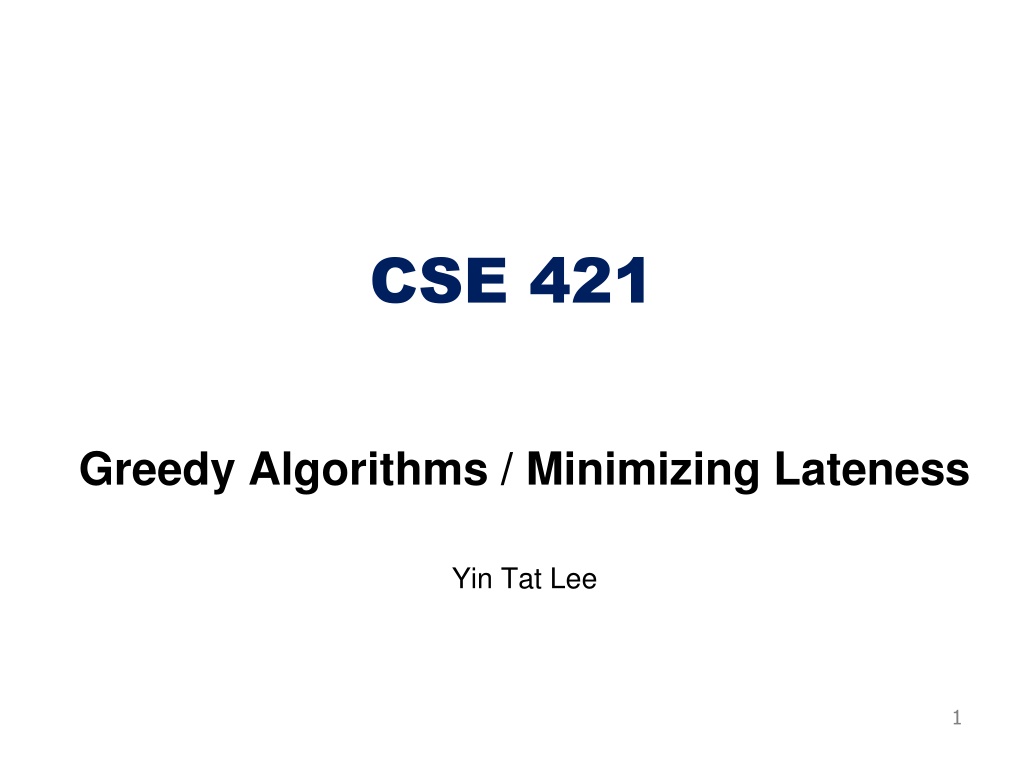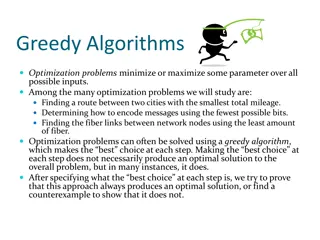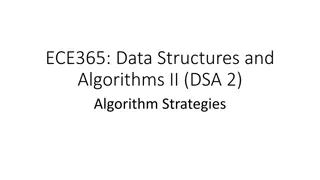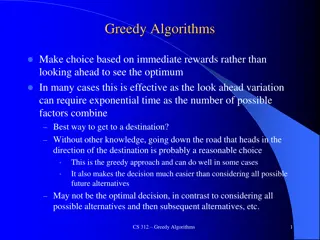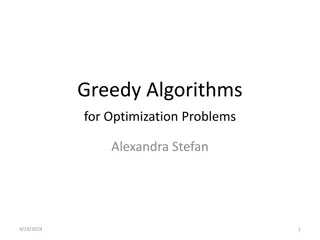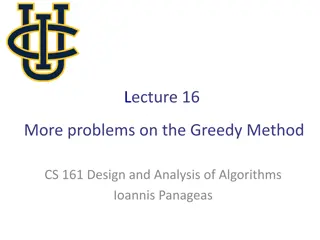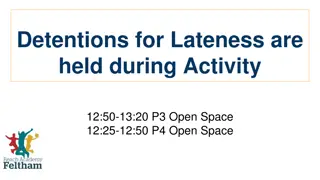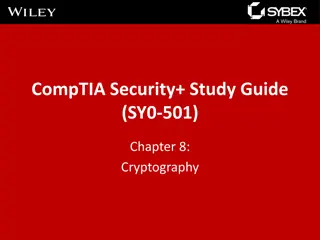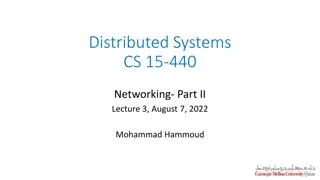Greedy Algorithms for Minimizing Lateness
The content discusses the application of greedy algorithms in minimizing lateness in scheduling tasks with deadlines. It covers strategies for finding optimal schedules to reduce lateness and maximize efficiency. Various approaches such as considering jobs by processing time, slack, and deadline are explored to achieve the objective of minimizing lateness efficiently.
Download Presentation

Please find below an Image/Link to download the presentation.
The content on the website is provided AS IS for your information and personal use only. It may not be sold, licensed, or shared on other websites without obtaining consent from the author. Download presentation by click this link. If you encounter any issues during the download, it is possible that the publisher has removed the file from their server.
E N D
Presentation Transcript
CSE 421 Greedy Algorithms / Minimizing Lateness Yin Tat Lee 1
Homework 1 Don t worry if your homework 1 grade is not ideal. You can recover score by extra credit. See the website for updated late and regrade policy. For Question 1: Some students prove the statement for the matching by G-S. This is wrong because there are stable matchings not produced by G-S. 2
Homework 1 If the solution involves reducing the problem into a question we solved in class, then the solution should look like: Reduction Outline Easy for TA to grade Proof of Runtime/Termination For Q2, involves proving stable matching satisfies (*) Proof of Correctness 3
Homework 1 If the solution involves a new algorithm (usually modified from an algo in class), then the solution should look like: Algorithm Outline Proof of Runtime/Termination Proof of Correctness 4
Greedy Analysis Strategies Greedy algorithm stays ahead Show that after each step of the greedy algorithm, its solution is at least as good as any other algorithm's. Structural Discover a simple "structural" bound asserting that every possible solution must have a certain value. Then show that your algorithm always achieves this bound. Exchange argument Gradually transform any solution to the one found by the greedy algorithm without hurting its quality. 5
Scheduling to Minimizing Lateness Similar to interval scheduling. Instead of start and finish times, request ? has Time Requirement ??which must be scheduled in a contiguous block Deadline ?? by which time the request would like to be finished Requests are scheduled into time intervals [??,??] s.t. ??= ?? ??. Lateness for request ? is If ??< ??then request ? is late by??= ?? ??otherwise its lateness ??= ? Goal: Find a schedule that minimize the Maximum lateness ? = ??? ? lateness = 2 1 2 3 4 5 6 3 2 1 4 3 2 ?? 6 8 9 9 14 15 ?? ?? lateness = 0 max lateness = 6 d3 = 9 d2 = 8 d6 = 15 d1 = 6 d5 = 14 d4 = 9 12 13 14 15 0 1 2 3 4 5 6 7 8 9 10 11
Minimizing Lateness: Greedy Algorithms Greedy template. Consider jobs in some order. [Shortest processing time first] Consider jobs in ascending order of processing time ??. 1 2 tj 1 10 dj 100 10 [Smallest slack] Consider jobs in ascending order of slack ?? ??. counterexample 1 2 1 10 tj dj 2 10 counterexample [Earliest deadline first] Consider jobs in ascending order of deadline ??. 7
Greedy Algorithm: Earliest Deadline First Sort deadlines in increasing order (?? ?? ??) ? ? for ? ? to ? to ?? ? ?? ??+ ?? ? ?? end for 1 2 3 4 5 6 3 2 1 4 3 2 ?? 6 8 9 9 14 15 ?? max lateness = 1 d1 = 6 d2 = 8 d3 = 9 d4 = 9 d5 = 14 d6 = 15 12 13 14 15 0 1 2 3 4 5 6 7 8 9 10 11 8
Proof for Greedy Algorithm: Exchange Argument We will show that if there is another schedule ? (think optimal schedule) then we can gradually change ? so that at each step the maximum lateness in ? never gets worse it eventually becomes the same cost as ? 9
Minimizing Lateness: No Idle Time Observation. There exists an optimal schedule with no idle time. d = 4 d = 6 d = 12 0 1 2 3 4 5 6 7 8 9 10 11 d = 4 d = 6 d = 12 0 1 2 3 4 5 6 7 8 9 10 11 Observation. The greedy schedule has no idle time. 10
Minimizing Lateness: Inversions Definition An inversion in schedule ? is a pair of jobs? and ? such that ??< ?? but ? scheduled before ?. inversion j i before swap Observation Greedy schedule has no inversions. Observation If a schedule (with no idle time) has an inversion, it has one with a pair of inverted jobs scheduled consecutively. Why? If all jobs are in order consecutively, then no inversion. 11
Minimizing Lateness: Inversions Definition An inversion in schedule ? is a pair of jobs? and ? such that ??< ?? but ? scheduled before ?. inversion ?? j i before swap i j after swap ?? Claim Swapping two adjacent, inverted jobs reduces the number of inversions by one and does not increase the max lateness. 12
Minimizing Lateness: Inversions Lemma: Swapping two adjacent, inverted jobs does not increase the maximum lateness. inversion ?? j i before swap i j after swap ?? Proof: Let ? be the schedule after swapping. Lateness ?? ??since ? is scheduled earlier in ? than in ? Requests ? and ? together occupy the same total time slot in both schedules All other requests ? ?,? have ?? = ?? ?? = ??so ?? Maximum lateness has not increased! = ?? ??= ?? ??< ?? ??= ?? 13
Optimal schedules and inversions Did we finish the proof for greedy? Claim: There is an optimal schedule with no idle time and no inversions Proof: By previous argument there is an optimal schedule ? with no idle time If ? has an inversion then it has a consecutive pair of requests in its schedule that are inverted and can be swapped without increasing lateness Eventually these swaps will produce an optimal schedule with no inversions Each swap decreases the number of inversions by 1 There are at most ?(? ?)/? inversions. (we only care that this is finite.) 14
Idleness and Inversions are the only issue Claim: All schedules with no inversions and no idle time have the same maximum lateness Proof: Schedules can differ only in how they order requests with equal deadlines Consider all requests having some common deadline ? Maximum lateness of these jobs is based only on the finish time of the last of these jobs but the set of these requests occupies the same time segment in both schedules Last of these requests finishes at the same time in any such schedule. 15
Earliest Deadline First is optimal We know that There is an optimal schedule with no idle time or inversions All schedules with no idle time or inversions have the same maximum lateness EDF produces a schedule with no idle time or inversions Therefore EDF produces an optimal schedule Life Wisdom: Finish your jobs according to deadline! Unfortunately, we don t see all jobs when born. 16
